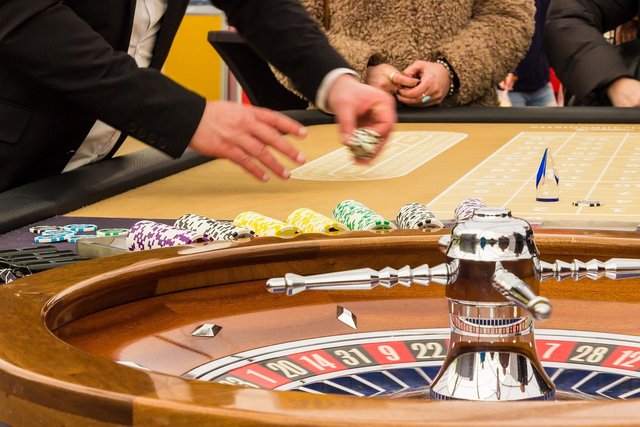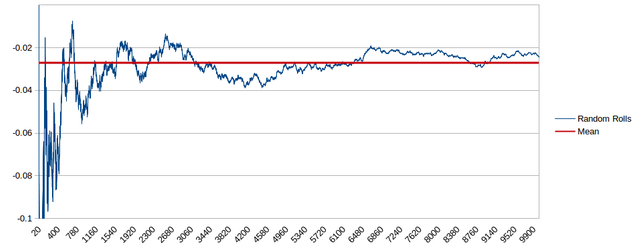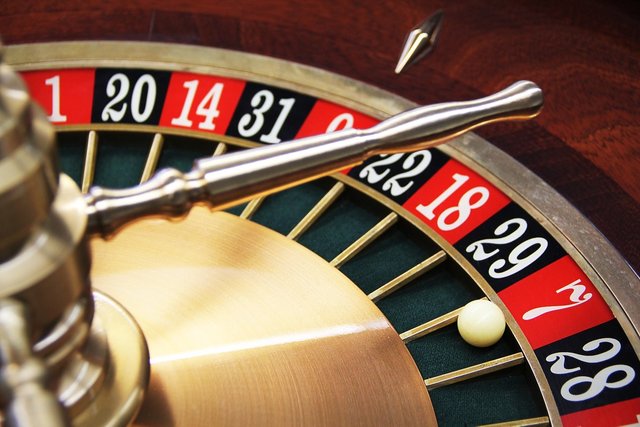Mathematics of Roulette

Roulette is one of the most popular casino games. In this article we will examine the math behind the game, and the probabilities of winning.
Roulette in French means "little wheel", it is a wheel based game, where you can bet on numbers and the properties of the numbers that will be chosen by the wheel.
Needless to say that the game has negative expectancy, regardless of the "strategy" you use, so you will probably lose through the longterm, however if you are "lucky" you can go away with some winnings in the short term.
There are major 2 variants, the European with 37 numbers and a house edge of 2.702702697% and the American version with 38 numbers and a house edge of 5.263157853%. There are also wheels with double-zero, and with single zero.
In this analysis we will look at the European version since it's "easier" to win with a smaller house edge. The green square with the 0 gives the house edge, since it imbalances the bets for example the black/red bet would have a 50-50% probability without the green 0, but with it it has a probability of win of only 48.648648649%. A 50-50% probability would still not result in a profit over longterm, since the profit will converge to 0, but with a negative house edge it converges to a loss, rather exponentially.
You can only win consistently if the expected value is higher than 0, but no gambling game offers that, since the casino would go bankrupt instantly. Instead gambling is just an entertainment game, and people should not look for it to get rich quick.
Playing
It doesn't matter how you bet, the expectancy is the same, only the probability - payout is skewed a little bit. For example betting on single numbers offers a larger payout, but has a small probability, but the expectancy is the same. For simplicity we will only talk about betting on colors: red/black in this example.
Betting on color gives exactly the 50% - house edge/2 probability. There are 37 numbers, 36 are colored, 1 is the zero. You have a probability of winning of 18/37, and a probability of losing of 19/37.
So it's 48.648648649% for black and 48.648648649% for red, and an extra 2.702702703% for the 0 ball, which is exactly the house edge (that skews it into negative EV), together it makes up 100%.
PROBABILITY OF WIN = 50% - HOUSE EDGE / 2The payout in the European roulette can be calculated with the following formula:
PAYOUT = 36 / SLOTS - 1Which in our red/black bet case, is 36/18-1 = 1. This means that you get back exactly 1x your bet if you win, or the odds are 2x, while the probability is what it is, shown above. So let's put it all together and see the EV:
EXPECTED VALUE = PROBABILITY_OF_WIN * PAYOUT - PROBABILITY_OF_LOSSSo this means that in our case we have a probability of win of 48.648648649%, and a probability of loss of 51.351351351%. If we bet red/black, with 1$, then our EV is:
EXPECTED VALUE = 48.648648649% * 1 - 51.351351351% = -2.702702702%It is exactly the negative of the house edge, because obviously what the house wins, we lose, longterm. So then we just calculate the profits, which is multiplied by our betsize & number of bets:
PROFIT = EXPECTED VALUE * BETSIZE * NR_OF_BETSFor example if we play 100 roulette games with a bet size of 10$, then we should expect to have at the end:
PROFIT = -2.702702702 * 10 * 100 = −2702.702702 $A profit of −2702.702702 $, very very profitable, what can I say. But of course this is the convergence value, if your bets converge towards the probability, but this is not always the case in a small sample size like 100 bets. You can have consecutive wins and losses, so it's all random, you cannot know what your profit will be, but it should converge towards this value.
Conclusion
Yes gambling is not profitable over the longterm ,because your profits will converge to the negative EV eventually, which means that you will lose money no matter what. But that doesn't mean that some gamblers could not get lucky and win something short-term. But most of you won't win, that is the key, it's all a game of randomness, and whoever is lucky wins something, but if they don't stop, then they will lose it all. So gambling should not be a business model for you!
It's the law of large numbers, numbers always converge towards their mean, and in this particular case the mean is negative so your profits will too be the same.
Here is a simulation on 10,000 bets, as you can see the mean is the house edge -0.027027027, however the bets deviate a little bit, in a normally distributed way (it's all random, but the distribution is normal), but they converge towards the mean over a long period of time:




Sho, Post very well executed!
Love the detailed breakdown & stats.
As I always said, Life is all about choices!
from now on, that might change to,
Life is all about choices, and some well calculated maths might help you make better ones!
The best way to win in gambling is to not gamble at all, other than that, you are sure to hand over all and with your eyes open, make no mistake about that.
Not losing is sometimes almost as good as winning.
If you want to win a game, don't play it! Invent it
so true :)
The conclusion being the more you gamble the more you loose.
You need to find game with less randomness :)
It's not randomness is the problem, it's the negative expectancy.
You can have randomness, with positive expectancy, a random walk with a drift or trend, where the mean , the variance and the covariance (of the lag) is constant, but the random variable is random inside these boundaries.
For example a price going up in this way would be easy to trade and make money from. The closest thing that resembles this are probably financial bonds, but only if their interest rate is not negative, haha.
http://www.investing.com/rates-bonds/euro-bund (monthly chart)
I agree. Was too quick in answering. Sorry.
Yes. But that is true on average. There can always emerge some lucky people who can win big. But if they continue after that, they will lose it all
Yeah but many must loose for a few to win.
Indeed, and the casino wins the most eventually. The distribution of wins in a casino is always a power curve, most people end up losing smaller amounts, but a few people win big.
That is why the casinos show only the top 10 winners, because there are probably no more than that... :D
yes very correct statement.
would be nice to know how to play
what do you mean?